Tehran, Tripoli, Tbilisi mark 2008 foreign policy
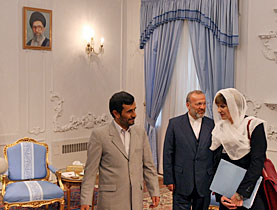
A diplomatic crisis with Libya, a controversial visit to Tehran as well as relations with the European Union made for the biggest foreign policy headlines this year.
Mediation and efforts to broker peace deals in the Caucasus region, in Latin America and Africa played an important part of Swiss government activities abroad.
However, the government’s foreign policy decisions and particularly Foreign Minister Micheline Calmy-Rey’s appearance on the international stage ruffled a few feathers.
In February Switzerland recognised the independence of the breakaway Serbian province of Kosovo, a move Calmy-Rey had openly backed for more than two years.
In response Serbia withdrew its ambassador to Bern, only allowing him to return to his post eight months later.
The foreign minister also stirred up a storm of protest when she visited Tehran in March to attend the signing ceremony for a gas deal between Iran and a private Swiss energy company.
Washington and Israel were among the harshest critics and Calmy-Rey had a hard time defending her trip.
Her opponents at home were particularly upset by pictures of her with her head covered when meeting Iran’s President Mahmoud Ahmedinejad.
She insisted that she had stressed the importance of human rights and public criticism of Iran’s denial of Israel’s right to exist. But her explanations fell on deaf ears and she was not invited to 60th anniversary celebrations of the Jewish state in May.
Gaddafi
A full-blown diplomatic crisis, described by the Swiss government as “one of the toughest challenges abroad” was triggered when Geneva police in July detained a son of Libya’s ruler, Moammar Gaddafi, on suspicion of mistreating his servants.
Libya, angered by the handling of the case, arrested Swiss citizens and prevented some of them from leaving the country.
Swiss companies were ordered to close, and air transport links were suspended. Tripoli threatened to take further measures, notably an embargo on crude oil deliveries and the withdrawal of assets from Swiss banks.
The Libyan government is still demanding an official apology for the arrest of Hannibal Gaddafi.
The Swiss foreign ministry has been in talks with Libya since the row broke out. While seeking to resolve the conflict by negotiation, it has stressed that Switzerland is governed by the rule of law and must act within legal norms.
EU
Relations with the EU – Switzerland’s most important trading partner – developed in a positive way in 2008, according to Urs Bucher head of the Swiss-EU Integration Office.
“It was a successful and busy year as both Swiss President Pascal Couchepin and EU Commission President José Manuel Barroso agreed at a meeting in December,” he said.
Switzerland, which is not a member of the 27-nation bloc, officially joined the border-free Schengen Area – which aims at closer cooperation between police forces and on asylum issues. It also launched negotiations on bilateral accords on health and a free trade agreement on agriculture.
Bucher points out that a dispute over cross-border trade regulations was resolved in talks. And he makes light of a simmering row over tax breaks for EU holding companies in Switzerland.
“Brussels has linked the tax row with the bilateral relations in general, but so far cooperation has not been adversely affected,” he said.
Switzerland summoned the German ambassador after Finance Minister Peer Steinbrück officially called for Switzerland to be put on a list of “uncooperative” EU tax havens. But the government also presented a blueprint for a reform of the fiscal system taking into account some of the EU concerns
A nationwide vote next February on continuing and extending the EU labour treaty – also known as the free movement of people accord – is crucial for the success of bilateral ties, according to Bucher.
“Restricted access to the EU market and a continuing legal uncertainty would be a major disadvantage for business under the present economic situation,” Bucher warned.
Mediation
Switzerland’s activities in promoting peace met with a mixed response at home and abroad.
Colombia said it would launch a criminal investigation into mediation efforts by the Swiss expert Jean-Pierre Gontard and the alleged handing over of ransom payments to leftwing rebels.
A meeting between a Swiss mediator and a wanted rebel leader from Uganda also raised a few eyebrows among centre-right politicians who are unconvinced by Calmy-Rey’s policy of “active neutrality” – seeking a bigger role for Switzerland in international conflict resolution.
A speech by Calmy-Rey to Swiss ambassadors in which she talked about conducting dialogue even with militants led to a public spat with the French news agency.
For his part Daniel Warner of the Geneva-based School of Diplomacy and International Relations welcomes Calmy-Rey’s efforts.
“Swiss foreign policy has been successful and its neutrality is a key element,” he said, adding that Switzerland’s voice is heard within the United Nations.
Switzerland also hosted direct talks between Iran and the United States – seen as an important element to boost the country’s reputation on the international scene.
Caucasus
The armed conflict that flared between Georgia and Russia in August gave Switzerland a special role to play in the Caucasus region.
The Swiss embassy in Tbilisi now represents Moscow’s interests in the region and a top Swiss diplomat, Heidi Tagliavini, was mandated by the European Union to lead an international investigation.
Several Swiss ministers travelled to Turkey in the past 12 months in what appeared to be a renewal of mutual interest. Bilateral relations have been strained – particularly over the mass killing of ethnic Armenians nearly 100 years ago and the alleged activities of Kurdish militant groups in exile.
Business interests are at stake in Turkey, notably the construction of a controversial dam at Ilisu for a major hydropower project and a gas pipeline from central Asia.
swissinfo, Urs Geiser and Andreas Keiser
Switzerland joined the UN in 2002 following a nationwide vote.
It is not a member of the EU, but has concluded 20 major bilateral treaties with the 27-nation bloc.
As a neutral state Switzerland cannot enter military alliances unless it is attacked. It is part of Nato’s Partnership for Peace Programme (PfP).
Switzerland has about 200 troops stationed in Kosovo as part of an international peace keeping mission.
It also provides military experts and participates in military observer missions.
The term refers to any initiative or contribution that encourages peace and international cooperation.
As a neutral country, Switzerland has made good offices one of the pillars of its foreign policy.
These can take different forms, for example organising international conferences, representing the interests of a foreign state and playing host to international organisations.

In compliance with the JTI standards
More: SWI swissinfo.ch certified by the Journalism Trust Initiative

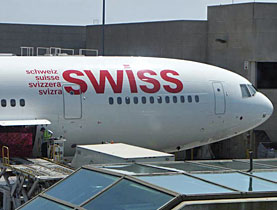
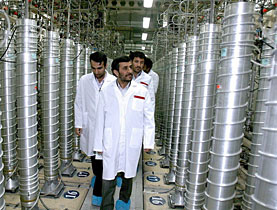
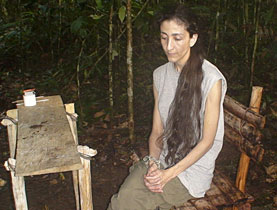
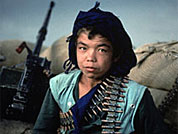
You can find an overview of ongoing debates with our journalists here. Please join us!
If you want to start a conversation about a topic raised in this article or want to report factual errors, email us at english@swissinfo.ch.